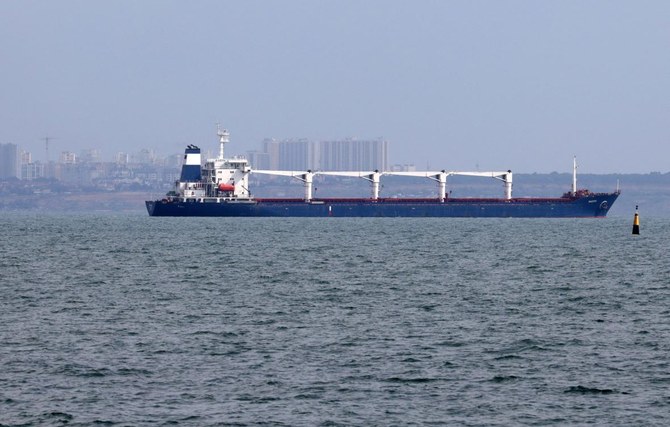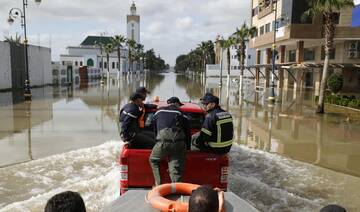KYIV, Ukraine: The first shipment of Ukrainian grain to leave Odessa since Russia’s invasion reached Turkey on Wednesday under a landmark deal to lift Moscow’s naval blockade in the Black Sea.
The Sierra Leone-flagged Razoni arrived at the edge of the Bosphorus Strait shortly after Kyiv announced the start of mandatory evacuations from the war-scarred Donetsk region now bearing the brunt of Russia’s five-month assault.
In Moscow, Russia’s supreme court labelled Ukraine’s Azov regiment a “terrorist” organization — a decision that could pave the way for fighters captured by the Kremlin to face lengthy jail terms.
The Razoni set sail under a deal brokered by Turkey and the United Nations aimed at getting millions of tons of trapped produce to world markets and curb a global food crisis.
It is due to be inspected Wednesday near Istanbul by a team that includes Russian and Ukrainian officials before delivering its cargo of 26,000 tons of maize to Tripoli, Lebanon.
The halt of deliveries from Ukraine — one of the world’s biggest grain exporters — has contributed to soaring food prices, hitting the world’s poorest nations especially hard.
Kyiv says at least 16 more grain ships are waiting to depart.
But it also accuses Russia of stealing Ukrainian grain in territories seized by Kremlin forces and then shipping it to allied countries in Africa and the Middle East, such as Syria.
Russia attacked the Odessa port from which the Razonia set off on Monday less than 24 hours after the grain deal was signed in Istanbul, putting the safety of future deliveries in doubt.
“Let’s wait and see how the agreement works and whether security will be really guaranteed,” Ukrainian President Volodymyr Zelensky said in a video address late Monday.
Yet Russia has continued to pound cities and towns across Ukraine’s sprawling front line.
Kyiv said it had started mandatory evacuations from the eastern region of Donetsk bearing the brunt of the Russian offensive after Zelensky urged the estimated 200,000 remaining residents to leave.
Ukrainian Deputy Prime Minister Iryna Vereshchuk said a train carrying “women, children, elderly people, many people with reduced mobility” arrived in the central city of Kropyvnytskyi on Tuesday morning.
More than 130 people were evacuated from the Donetsk region, governor Pavlo Kyrylenko said.
Officials have said they want to get residents out of the battered region before the start of winter as gas pipes for heating have been severed.
In the south of the country, the head of Ukraine’s Kryviy Rig military administration said Russian shelling had killed two civilians in a minibus trying to leave the Moscow-controlled Kherson region.
Oleksander Vilkul said two other passengers were in serious condition in hospital with burns.
The mayor of the city of Mykolaiv, the closest to where Ukrainian forces are looking to launch a counter-offensive in Kherson, said Russian strikes had damaged a university dormitory.
He said in a briefing that 403 people had been killed in his region since the invasion but added that a looming Ukraine counter-offensive for the neighboring Kherson region “will result in a decrease of shelling.”
Ukraine was bolstered by more supplies of Western arms — particularly long-range artillery — as it looks to launch a major push in the south to retake Kherson.
The United States announced a new tranche of weapons worth $550 million for Ukraine’s forces, including ammunition for increasingly important rocket launchers and artillery pieces.
“Our artillerymen are ready to turn night into day to expel the Russian invaders,” Ukraine’s Defense Minister Oleksiy Reznikov said.
In Moscow meanwhile, Russia paved the way for handing tough prison sentences to captured members of Ukraine’s Azov regiment.
Fighters from Azov were among 2,500 Ukrainian soldiers who surrendered in May after weeks of fierce resistance at the Azovstal steel plant in devastated Mariupol.
The regiment — which was incorporated into Ukraine’s national guard in 2014 — is demonized by Moscow for alleged far-right links.
Its members were among 50 Ukrainian servicemen killed last week in an attack on a jail holding prisoners of war in Russian-occupied territory.
Ukraine has accused Moscow of deliberately executing the detainees, while Russia says Ukrainian forces hit the facility with missiles.
Azov, in response to the Russian court ruling, called on the US and other countries to recognize Russia as a “terrorist state.”
First Ukrainian grain shipment since invasion reaches Turkey
https://arab.news/46vbq
First Ukrainian grain shipment since invasion reaches Turkey

- The Sierra Leone-flagged Razoni arrived at the edge of the Bosphorus Strait
- It is due to be inspected Wednesday near Istanbul by a team that includes Russian and Ukrainian officials
Morocco’s energy ministry puts gas pipeline project on hold

- The country’s natural gas demand is expected to rise to 8 billion cubic meters in 2027 from around 1 bcm currently, according to ministry estimates
RABAT: Morocco’s energy ministry said on Monday it has paused a tender launched last month for a gas pipeline project, without giving details on the reasons for the suspension.
The tender sought bids to build a pipeline linking a future gas terminal at the Nador West Med port on the Mediterranean to an existing pipeline that allows Morocco to import LNG through Spanish terminals and supply two power plants.
It also covered a section that would connect the existing pipeline to industrial zones on the Atlantic in Mohammedia and Kenitra.
“Due to new parameters and assumptions related to this project... the ministry of energy transition and sustainable development is postponing the receipt of applications and the opening of bids received as of today,” the ministry said in a statement.
Morocco is looking to expand its use of natural gas to diversify away from coal as it also accelerates its renewable energy plan, which aims for renewables to account for 52 percent of installed capacity by 2030, up from 45 percent now.
The country’s natural gas demand is expected to rise to 8 billion cubic meters in 2027 from around 1 bcm currently, according to ministry estimates.













